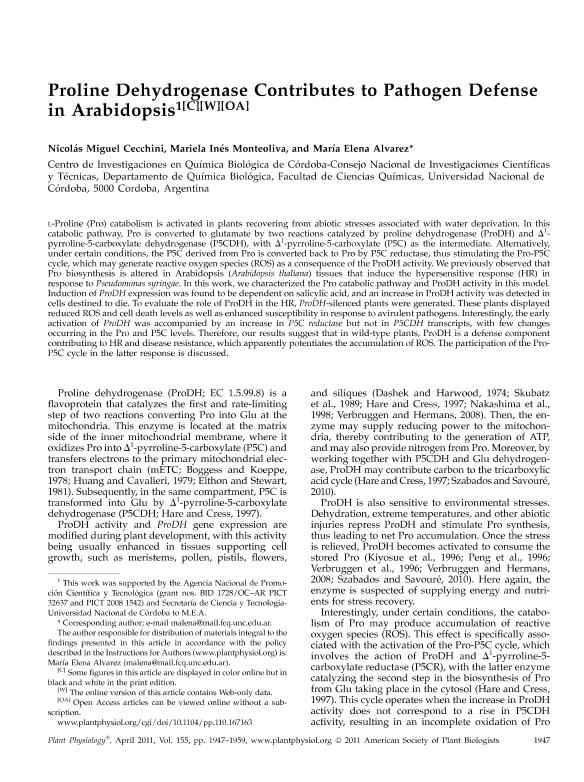Mostrar el registro sencillo del ítem
dc.contributor.author
Cecchini, Nicolas Miguel

dc.contributor.author
Monteoliva, Mariela Inés

dc.contributor.author
Alvarez, Maria Elena

dc.date.available
2024-03-13T14:05:23Z
dc.date.issued
2011-02-10
dc.identifier.citation
Cecchini, Nicolas Miguel; Monteoliva, Mariela Inés; Alvarez, Maria Elena; Proline dehydrogenase contributes to pathogen defense in Arabidopsis; American Society of Plant Biologists; Plant Physiology; 155; 4; 10-2-2011; 1947-1959
dc.identifier.issn
0032-0889
dc.identifier.uri
http://hdl.handle.net/11336/230402
dc.description.abstract
L-Proline (Pro) catabolism is activated in plants recovering from abiotic stresses associated with water deprivation. In this catabolic pathway, Pro is converted to glutamate by two reactions catalyzed by proline dehydrogenase (ProDH) and delta 1-pyrroline-5-carboxylate dehydrogenase (P5CDH), with delta 1-pyrroline-5-carboxylate (P5C) as the intermediate. Alternatively, under certain conditions, the P5C derived from Pro is converted back to Pro by P5C reductase, thus stimulating the Pro-P5C cycle, which may generate reactive oxygen species (ROS) as a consequence of the ProDH activity. We previously observed that Pro biosynthesis is altered in Arabidopsis (Arabidopsis thaliana) tissues that induce the hypersensitive response (HR) in response to Pseudomonas syringae. In this work, we characterized the Pro catabolic pathway and ProDH activity in this model. Induction of ProDH expression was found to be dependent on salicylic acid, and an increase in ProDH activity was detected in cells destined to die. To evaluate the role of ProDH in the HR, ProDH-silenced plants were generated. These plants displayed reduced ROS and cell death levels as well as enhanced susceptibility in response to avirulent pathogens. Interestingly, the early activation of ProDH was accompanied by an increase in P5C reductase but not in P5CDH transcripts, with few changes occurring in the Pro and P5C levels. Therefore, our results suggest that in wild-type plants, ProDH is a defense component contributing to HR and disease resistance, which apparently potentiates the accumulation of ROS. The participation of the Pro-P5C cycle in the latter response is discussed.
dc.format
application/pdf
dc.language.iso
eng
dc.publisher
American Society of Plant Biologists

dc.rights
info:eu-repo/semantics/openAccess
dc.rights.uri
https://creativecommons.org/licenses/by-nc-sa/2.5/ar/
dc.subject
Proline dehydrogenase
dc.subject
Arabidopsis thaliana
dc.subject
Pseudomonas syringae
dc.subject
Pathogen defense
dc.subject.classification
Bioquímica y Biología Molecular

dc.subject.classification
Ciencias Biológicas

dc.subject.classification
CIENCIAS NATURALES Y EXACTAS

dc.title
Proline dehydrogenase contributes to pathogen defense in Arabidopsis
dc.type
info:eu-repo/semantics/article
dc.type
info:ar-repo/semantics/artículo
dc.type
info:eu-repo/semantics/publishedVersion
dc.date.updated
2024-03-05T13:14:38Z
dc.identifier.eissn
1532-2548
dc.journal.volume
155
dc.journal.number
4
dc.journal.pagination
1947-1959
dc.journal.pais
Estados Unidos

dc.description.fil
Fil: Cecchini, Nicolas Miguel. Consejo Nacional de Investigaciones Científicas y Técnicas. Centro Científico Tecnológico Conicet - Córdoba. Centro de Investigaciones en Química Biológica de Córdoba. Universidad Nacional de Córdoba. Facultad de Ciencias Químicas. Centro de Investigaciones en Química Biológica de Córdoba; Argentina
dc.description.fil
Fil: Monteoliva, Mariela Inés. Universidad Nacional de Córdoba. Facultad de Ciencias Químicas. Departamento de Química Biológica; Argentina. Instituto Nacional de Tecnología Agropecuaria. Centro de Investigaciones Agropecuarias. Unidad de Estudios Agropecuarios - Consejo Nacional de Investigaciones Científicas y Técnicas. Centro Científico Tecnológico Conicet - Córdoba. Unidad de Estudios Agropecuarios; Argentina
dc.description.fil
Fil: Alvarez, Maria Elena. Universidad Nacional de Córdoba. Facultad de Ciencias Químicas. Departamento de Química Biológica; Argentina. Consejo Nacional de Investigaciones Científicas y Técnicas. Centro Científico Tecnológico Conicet - Córdoba. Centro de Investigaciones en Química Biológica de Córdoba. Universidad Nacional de Córdoba. Facultad de Ciencias Químicas. Centro de Investigaciones en Química Biológica de Córdoba; Argentina
dc.journal.title
Plant Physiology

dc.relation.alternativeid
info:eu-repo/semantics/altIdentifier/doi/http://dx.doi.org/10.1104/pp.110.167163
dc.relation.alternativeid
info:eu-repo/semantics/altIdentifier/url/https://academic.oup.com/plphys/article/155/4/1947/6108888
Archivos asociados
